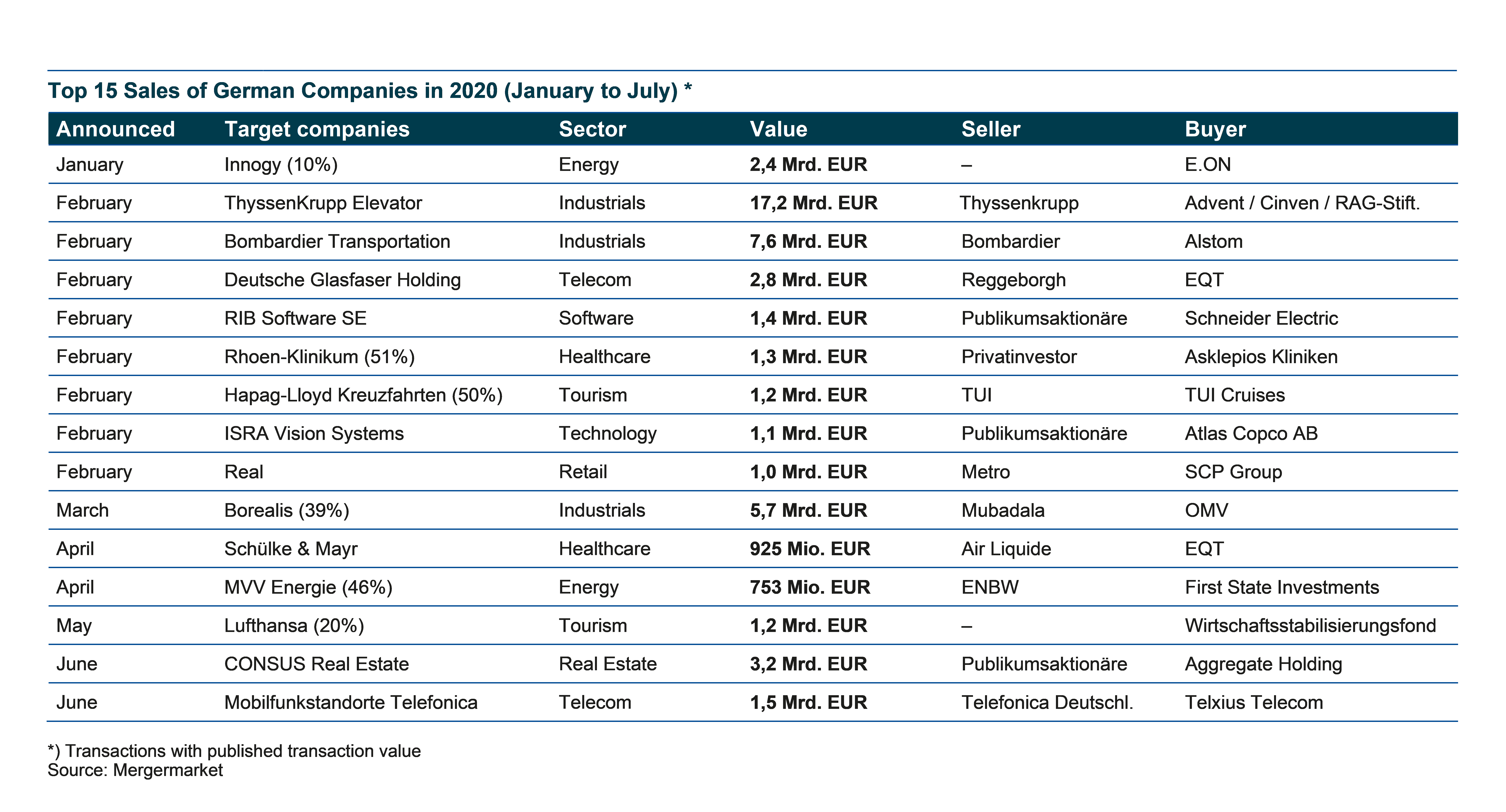M&A Market in Germany: Expected Revival after Coronavirus
Transactions will increasingly be characterized by distressed sales and defensive, less strategically motivated deals
The corona crisis has left the global economy and M&A business in an unprecedented state of shock since the end of March 2020 offset. Nevertheless, after the summer break, we again expect relatively brisk takeover activity by German companies, because there are a number of additional drivers. W&I policies will continue to play an increasing role in protection | Dr. Michael R. Drill
| The economic effects of the COVID-19 pandemic are not yet fully foreseeable. However, there is consensus among top economists that Germany will fall into a deep recession in the coming months on an unprecedented scale. As a result of declining demand and willingness to invest, many companies will have to rethink their existing business models and carry out restructurings.
In an environment marked by earnings declines, uncertainties and pessimism, the Coronavirus has severely infected the M&A business of some industries in recent months and largely brought it to a standstill: In the second quarter of 2020, the number of transactions with German target companies fell by more than 70%. However, since most companies are again operating trouble-free and the markets are largely stabilizing, the general M&A sentiment has quickly returned to positive. |
Drivers for the German M&A Market 2021
|
Summary
-
Lincoln International's Michael Drill, CEO Germany and Managing Director, discusses the state of mergers and acquisitions (M&A) market in Germany in a post-Coronavirus (COVID-19) world.
- Sign up to receive Lincoln's perspectives

| Thus, strategic buyers, especially large foreign companies, are once again able to act and make decisions, even if they are still relatively cautious and wary in ongoing M&A processes. In addition, financial investors continue to be under strong investment pressure; after all, the private equity industry has not forgotten that the most successful investments were made immediately after the financial and economic crisis of 2008/09. As a result, we expect a noticeable pick-up of deal activity in Germany after the summer break, not only as a result of catch-up effects.
While the market has been shaped by a booming economy and rapid euphoriain recent years, other drivers of mergers and acquisitions will be at the forefront in the future. Decline in profits, subdued economic prospects and the need for larger corporate units with a global footprint force many medium-sized companies to sell to a larger or financially strong partner. But also for owners of profitable, healthy companies, the window for a successful company sale opens up again in 2021. The acquisition of German Hidden Champions is at the top of the list of priorities for foreign strategists – particularly from the USA and Asia – as well as for financial investors. Double-digit EBITDA multipliers are still paid for companies with earnings margins of 15% or more. |
The private equity industry has not forgotten that the most successful investments were made immediately after the financial and economic crisis of 2008/09. |
|
The acquisition of German Hidden Champions is at the top of the list of priorities for foreign strategists and financial investors.
The acquisition of German Hidden Champions is at the top of the list of priorities for foreign strategists and financial investors |
Corporate Divestitures: Expected Increase Large corporations need to prioritize their portfolio round-ups in order to generate liquidity and better focus on their core business. Due to the continuing liquid market environment, we therefore expect a significant increase in “corporate divestments”. Primarily, these will be below-average profitable business activities, which will affect the return on investment and the growth profile of the groups. We assume that mergers and acquisitions will be affected in almost all sectors. In cyclical industrial sectors, in the tourism sector and in the retail trade, so called distressed deals are increasingly on the agenda. We expect a unique economic M&A situation in the heavily pressured automotive supplier industry. Conversely however, some sectors are also emerging from the crisis stronger: strategically motivated, highly valued deals will continue to take place in the non- cyclical and strongly growing sectors such as healthcare, medical technology, biotechnology, software, IT services, technology or e-commerce. German Mid-Cap Segment: plethora of deals to be seen Conclusion |
Contributor

Building long-term relationships is key for me personally – I want to be the advisor of trust for my clients.
Dr. Michael Drill
Managing Director & Head of Germany
FrankfurtProfessionals with Related Expertise

I am enthusiastic about creating sustainable growth and the highest value for our clients and strive to leave a positive footprint beyond any successful M&A transaction.
Friedrich Bieselt
Managing Director & Head of Business Services, Europe
Frankfurt
Building long-term relationships is key for me personally – I want to be the advisor of trust for my clients.
Dr. Michael Drill
Managing Director & Head of Germany
Frankfurt
I enjoy working closely with clients to overcome challenging situations and to develop strategies to meet their business goals.
Dirk-Oliver Löffler
Managing Director & Co-head of Healthcare, Europe
Frankfurt
I lead with an entrepreneurial mindset and serve as a trusted advisor to our clients, delivering deep process and sector expertise to help them thrive in a rapidly evolving technology landscape.
Harald Mährle
Managing Director & Global Co-head, Technology
Munich
I maintain an open and transparent dialogue with clients to achieve mutually beneficial outcomes.
Juan Carlos Montoya
Managing Director
Frankfurt
I empower my clients to achieve positive outcomes in the dynamic digital consumer landscape, leveraging deep sector expertise and a trusted, hands-on approach.
Monika Nickl
Managing Director & Co-head of Consumer, Europe
Munich





